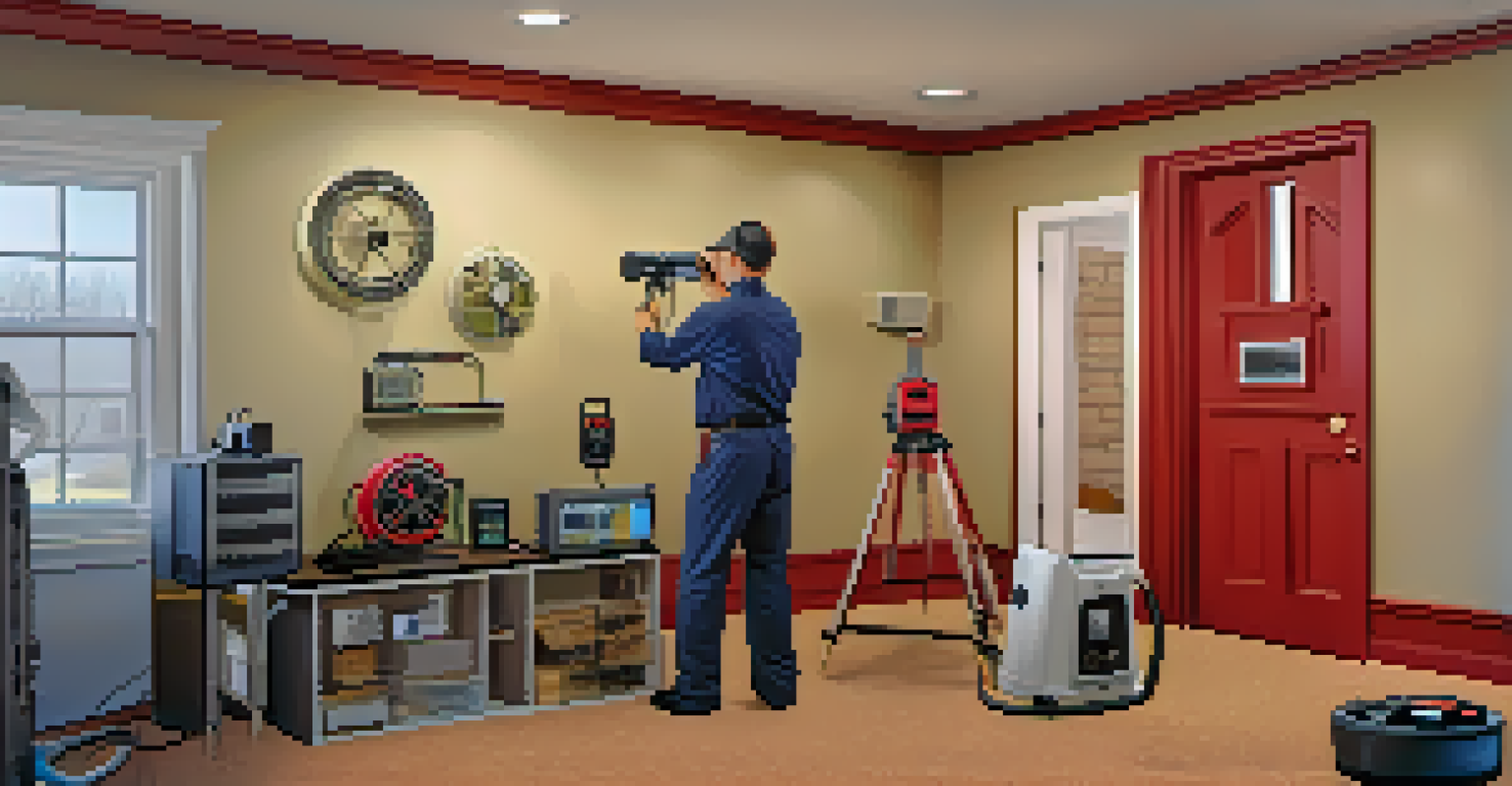Understanding Energy Audits: What Homeowners Should Know

What is an Energy Audit and Why Do You Need One?
An energy audit is a comprehensive assessment of your home's energy use, designed to identify inefficiencies and recommend improvements. Think of it as a health check-up for your home, aimed at pinpointing where energy is wasted. By understanding your energy consumption patterns, you can make informed decisions about upgrades that can save you money in the long run.
Energy efficiency is not just a goal; it's a strategy for a sustainable future.
For homeowners, this process can reveal surprising insights, such as hidden drafts, outdated appliances, or poor insulation. Addressing these issues not only enhances comfort but also reduces your overall utility bills. In today’s eco-conscious world, many homeowners are also motivated by the desire to lower their carbon footprint, making energy audits a valuable tool.
Ultimately, an energy audit is your first step toward a more efficient, sustainable home. Whether you're preparing for renovations or simply looking to save on bills, knowing what to expect can help you maximize the benefits of the process.
Types of Energy Audits Available
There are generally two types of energy audits: a walkthrough audit and a detailed energy audit. A walkthrough audit is usually a quick, informal assessment conducted by a professional or even by the homeowner. This type often involves checking for obvious problems such as drafts around windows or doors, and providing basic recommendations.

On the other hand, a detailed energy audit is more comprehensive and involves specialized equipment. This might include blower door tests to measure air leaks or thermographic inspections to find hidden insulation issues. While this type of audit may cost more upfront, the in-depth insights can lead to significant long-term savings.
Understanding Energy Audits
An energy audit assesses your home's energy use to identify inefficiencies and recommend improvements.
Choosing the right type of audit depends on your specific needs and goals. If you're just starting to explore energy efficiency, a walkthrough might be sufficient, but a detailed audit is worth considering if you're ready for major upgrades.
What to Expect During an Energy Audit
During your energy audit, expect a thorough examination of various aspects of your home, including heating and cooling systems, insulation, and even lighting. The auditor will typically start by asking questions about your energy bills and how you use energy at home. This step helps them tailor their assessment to your unique situation.
The best way to predict the future is to create it.
Next, they will conduct a physical inspection of the home, using tools like thermometers and pressure gauges to measure efficiency. They may also check appliances to see if they meet energy standards and evaluate your home's overall energy flow. This hands-on approach ensures nothing is overlooked.
At the end of the audit, you'll receive a detailed report outlining findings and recommendations. This report is your roadmap for improving your home's energy efficiency and could include suggestions for insulation upgrades, energy-efficient appliances, or even behavioral changes in energy use.
Cost of an Energy Audit and Potential Savings
The cost of an energy audit can vary widely, typically ranging from $100 to $500 depending on the type and complexity of the audit. While this may seem like a significant expense, the potential savings on energy bills often far outweigh the initial investment. Many homeowners report annual savings that can exceed the cost of the audit within just a few years.
In addition to direct savings on utility bills, many local governments and utility companies offer rebates or incentives for energy audits and subsequent upgrades. This means that your out-of-pocket expenses could be significantly reduced if you take advantage of available programs. It's a win-win situation that makes improving efficiency more accessible.
Types of Audits Explained
Walkthrough audits provide a quick assessment, while detailed audits use specialized tools for comprehensive analysis.
Ultimately, investing in an energy audit is not just about immediate savings; it's about creating a more sustainable home. By understanding your energy use and making informed upgrades, you position yourself for long-term financial and environmental benefits.
How to Prepare for Your Energy Audit
Preparing for an energy audit can help streamline the process and ensure you get the most out of it. Start by gathering your utility bills from the past year, which will give the auditor a clear picture of your energy usage patterns. Also, consider jotting down any specific concerns or areas of discomfort in your home, like drafty rooms or high energy costs.
Next, make sure your home is accessible for the auditor. This might mean clearing any clutter away from heating vents or electrical panels. If you have an attic or crawl space, ensure those areas are also accessible, as they are crucial for a complete assessment.
Lastly, be prepared to ask questions during the audit. This is your opportunity to learn more about how your home uses energy and what changes can be made. Engaging with the auditor will provide you with a better understanding of the recommendations and how to implement them effectively.
Post-Audit Steps: Implementing Recommendations
After your energy audit, you’ll receive a list of recommendations tailored to your home. It's essential to prioritize these suggestions based on your budget and the potential return on investment. For instance, if your audit reveals that your insulation is lacking, upgrading it can lead to significant savings and comfort improvements.
Some recommendations may involve simple DIY projects, like sealing drafts or changing light bulbs to more energy-efficient options. Others might require hiring professionals, especially for larger tasks like replacing heating systems or installing new windows. Make sure to gather multiple quotes to find the best value for any professional work.
Post-Audit Action Steps
Implementing audit recommendations can lead to significant energy savings and a more sustainable home.
Implementing these recommendations can be a gradual process, but taking action will lead to noticeable improvements over time. Not only will you likely see a reduction in your energy bills, but you'll also enjoy a more comfortable living environment and contribute positively to the planet.
The Broader Impact of Energy Audits
Energy audits do more than just save you money; they contribute to a broader environmental impact. By making your home more energy-efficient, you're reducing your carbon footprint and promoting sustainability. This is increasingly important as we collectively face climate change and the need for energy conservation.
Moreover, energy-efficient homes can enhance community resilience. When homeowners invest in efficiency upgrades, they typically see a decrease in overall energy demand. This can lead to reduced strain on local resources and infrastructure, benefiting everyone in the community.

In addition, energy audits can help stimulate the economy by encouraging investments in local energy efficiency businesses and contractors. This not only creates jobs but also promotes innovation in energy-saving technologies, paving the way for a greener future.